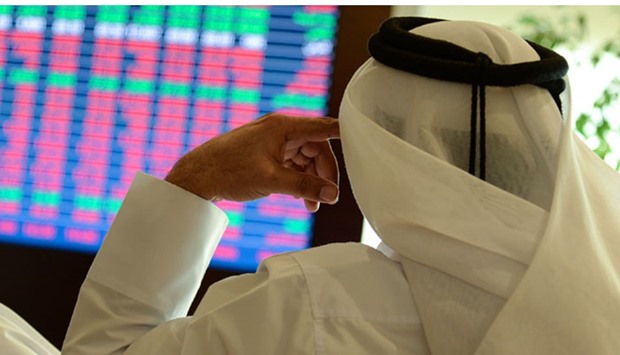Real estate, industrials and consumer goods suffered the most in QSE during the week which saw an international rating agency Standard and Poor’s say that Qatar has “significant” strength in defending its fixed exchange parity with the dollar due to availability of reserves to cover the monetary base and current account payments over the next four years.
The UN atomic watchdog's green signal to end Iran sanctions and its fears over supply glut in the oil market appears caused mayhem on the opening day of the week, after which it was largely stable but to witness some sporadic gains on Tuesday on marginal strength in oil prices. However, subsequent slide in oil prices led to a bearish run for the remaining two days and thus the index settled lower.
Iran had said its exports would rise by 1mn barrels a day within six months of sanctions being lifted.
Local retail investors’ buying support weakened considerably and their non-Qatari counterparts turned bearish during the week which saw Qatar Islamic Bank report 22% increase in net profit in 2015.
More than 88% of the stocks were in the red during the week which saw Qatar Insurance Company report a 4% jump in net profit in 2015.
Notwithstanding robust buying interests of domestic institutions, the 20-stock Qatar Index plummeted 6.54% during the week which al khaliji register 11% growth in net profit in 2015.
Dubai tanked 6.87%, Saudi Arabia shrank (6.42%), Kuwait (6.07%), Abu Dhabi (5.52%), Muscat (4.8%) and Bahrain (2.95%) during the week which witnessed Gulf Warehousing 2015 net profit expand 32%.
QSE has fallen 17.69% year-to-date against 20.95% in Saudi Arabia, 16.79% in Dubai, 13.24% in Abu Dhabi, 11.91% in Kuwait, 9.97% in Muscat and 4.15% in Bahrain.
Selling was seen intense particularly in the small cap equities during the week which saw an expansion of total trade turnover.
However, foreign institutions’ net profit booking was seen weakening during the week which saw overall trade volumes gain.
The index that tracks Shariah-principled stocks was seen melting faster than the other indices during the week which witnessed the realty, banking and industrials sectors account for about 66% of the total trading volume.
The 20-stock Total Return Index plunged 6.54%, All Share Index (comprising wider constituents) by 6.59% and Al Rayan Islamic Index by 8.96% during the week which saw Gulf International Services (GIS) and Masraf Al Rayan dominate the trading ring in terms of volume and value.
Real estate stocks plummeted 11.9%, industrials (8.91%), consumer goods (7.38%), insurance (4.76%), banks and financial services (4.57%) and transport (4.18%); whereas telecom gained 1.99% during the week which saw global insurance rating agency A M Best affirm the financial strength rating of “A- (Excellent)” and the issuer credit rating of “a-” of Qatar General Insurance and Reinsurance Company (QGIR), the second largest insurer in the country, with “stable” outlook.
Market capitalisation eroded 6.43% to QR458.42bn with small, large, micro and mid cap equities melting 8%, 5.61%, 4.88% and 4.37% respectively during the week.
Small, large, micro and mid cap stocks have fallen year-to-date 17.63%, 17.21%, 16.6% and 14.81% respectively.
Of the 43 stocks, 38 declined, while only four advanced and one was not traded. As many as 11 of the 12 banks and financial services; eight of the nine industrials; seven of the eight consumer goods; all of the five insurance and the four real estate; two of the three transport and one of the two telecom stocks closed lower during the week.
Major influential losers included Industries Qatar, Qatari Investors Group, Ezdan, Barwa, Vodafone Qatar, Nakilat, Mesaieed Petrochemical Holding, Gulf International Services, QIB, Doha Bank, Masraf Al Rayan, Alijarah Holding, Dlala and Qatar National Cement; even as Ooredoo notably bucked the trend during the week.
Local retail investors’ net buying declined substantially to QR72.5mn compared to QR162.88mn the previous week.
Non-Qatari retail investors turned net sellers to the tune of QR15.38mn against net buyers of QR14.15mn the week ended January 14.
However, domestic institutions’ net buying increased perceptibly to QR127.79mn compared to QR49.12mn the previous week.
Foreign institutions’ net profit booking weakened to QR184.91mn against QR226.14mn the week ended January 14.
Total trade volume rose 77% to 49.49mn shares, value by 32% to QR1.52bn and transactions by 54% to 27,054 during the week.
The telecom sector’s trade volume almost tripled to 6.68mn equities and value more than doubled to QR114.79mn on more than doubled deals to 4,220.
The consumer goods sector’s trade volume more than doubled to 6.47mn stocks, value soared 53% to QR142.99mn and transactions by 63% to 2,948.
There was more than doubling of the insurance sector’s trade volume and value to 0.43mn shares and QR27.42mn respectively on 81% jump in deals to 441.
The real estate sector’s trade volume more than doubled to 12.59mn equities, value surged 61% to QR214.91mn and transactions by 61% to 4,615.
The market witnessed 97% increase in the transport sector’s trade volume to 3.08mn stocks, 74% in value to QR78.88mn and 67% in deals to 1,391.
The banks and financial services sector’s trade volume shot up 35% to 11.74mn shares, value by 21% to QR592.03mn and transactions by 44% to 8,123.
The industrials sector saw 26% expansion in trade volume to 8.29mn equities, 8% in value to QR352.14mn and 30% in deals to 5,316.
In the debt market, there was no trading of treasury bills and government bonds during the week.

